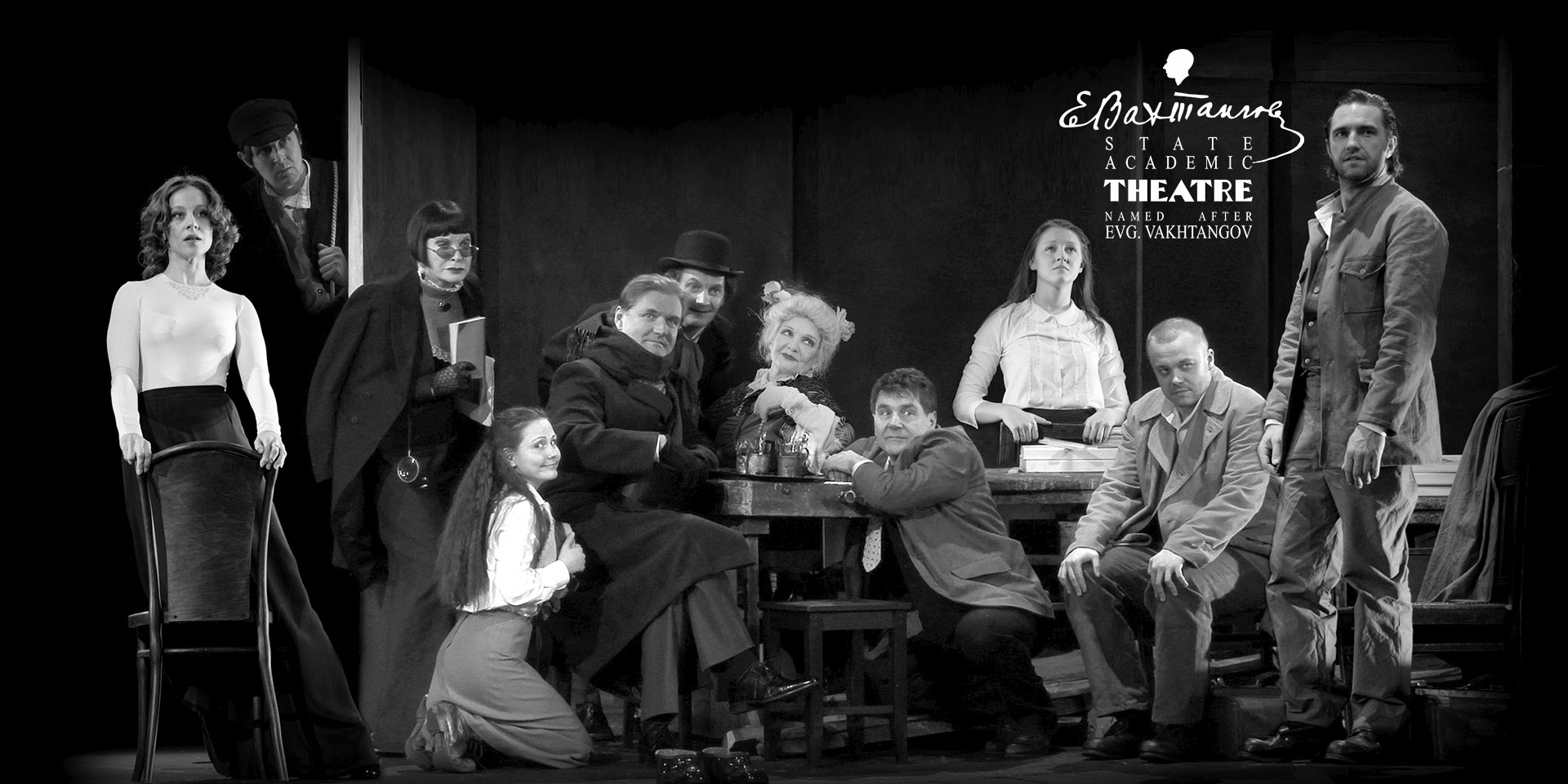A forlorn trumpet heralds the start of the Vakhtangov State Academic Theatre’s production of Anton Chekhov’s Uncle Vanya, now playing just four performances at New York City Center as part of the Cherry Orchard Festival. Lethargic strings haltingly join in as Doctor Mikhail Astrov (Artur Ivanov) stares upstage into the void. This is the adagio of his life — the long period of cautious predictability before a manic final movement that will send him to the grave. This musical motif returns regularly in director Rimas Tuminas’s boldly stylish staging of this story of crestfallen Russians in love.
It takes place on the country estate owned by Professor Serebryakov (Vladimir Simonov), who inherited the property from his late wife. Her brother, Vanya (Sergey Makovetskiy), and daughter, Sonya (Maria Berdinskikh), have maintained the property faithfully for many years while sending the meager profits to Serebryakov. But the professor has returned with his new wife, Elena (Anna Dubrovskaya), right as Vanya has realized that his entire life has been wasted serving a mediocre academic. Making matters worse, Vanya’s own mother (Liudmila Maksakova) seems to like her son-in-law more. When the professor decides he wants to sell the house and convert the proceeds into bonds to support a life in the city, Vanya snaps.
Meanwhile, Astrov longs for Elena, but Sonya pines after Astrov. None of them are satisfied with their lives, not even the ostensibly well-off professor, who looks down his nose at these country bumpkins (Simonov keeps us laughing with his elderly man-baby routine).
As with his excellent staging of Eugene Onegin, Tuminas fills the production with music and ritual. Hardly a minute passes that is not underscored by Faustas Latenas’s evocative original score, which runs the gamut from flirtatious to funereal. Tuminas often seems to be choreographing to this underscoring, precisely staging in a way that is more dramatic poetry than prose. His approach is somewhat similar to the „memory play“ concept of Tennessee Williams’s The Glass Menagerie, in which elements are accentuated depending on their staying power in the mind of the narrator.
Adomas Yatsovskis’s set features just the furniture that would leave the most lasting impression: a dusty piano, a large stone lion statue, a leather hallway sofa. Yatsovskis’s costumes blend eras and styles to offer a sense of the character without overly specifying the period. Maya Shavdatuashvili’s dreamy lighting gives everything the feel of a hazy recollection.
It is an admirable and daunting task to pull Chekhov out from under the long shadow of Stanislavski’s naturalistic staging (the great Russian acting teacher directed the original production while also playing Astrov). Unfortunately, in many key passages of the play, Tuminas has not replaced it with something sturdier. His expressionistic staging works best when it is doing the least: For instance, when Elena and Astrov converse, they stare directly out at the audience rather than each other, as if each was unable to conjure the painful memory of the other’s face.
Other moments are less effective: When Astrov takes Elena over his knee before jumping on top of her in the third act (an exaggeration of the typical kiss and embrace) the scene loses its surreptitious allure. Astrov later carries Elena across the stage like a rag doll and places her on Vanya’s lap, seemingly a comment on how Russian machismo degrades and humiliates women. It’s a valid point, but the way that it is performed comes across like a first choice from a scene study in which actors are tasked with finding the essence of the moment; it’s not a finished product. Worse, it shifts Astrov from being a tree-hugging country doctor into someone more closely resembling a brutish bouncer brooding outside a nightclub.
Some of this has to do with Ivanov, who is a lot younger and ruddier than the typical Astrov. He delivers his lines in a menacing deadpan, as if he is trying to preserve energy by not moving. Still, Ivanov’s age serves to augment Astrov’s tragedy: There is something terribly sad about someone so young and healthy having such a dim outlook. As the servant Efim (a mime-like Sergey Epishev) loads him down with traveling cases like a pack horse, we feel the burden of his despair.
Maria Berdinskikh gives one of the other standout performances of the show. At one point, as she was sobbing about her inability to get Astrov’s attention, a man in the audience began cruelly laughing. Berdinskikh looked straight at him as she delivered the line, „I am plain. I know it.“ It is always exciting to watch an actor like Berdinskikh seize such opportunities to create a thrilling live experience.
Certainly, many theatergoers will purchase tickets to see Makovetskiy, a major star of Russian stage and film. He gives a heartrending portrayal of a broken man, traveled too far down a road to go back again. The final scene, in which he just looks at the floor as Sonya talks of their reward in heaven, is absolutely devastating.
Not all of Tuminas’s choices are as powerful, but the daring and inventive Vakhtangov staging of Uncle Vanya makes a good argument for the durability of Chekhov. These plays are so rich with humanity that it is easy to see new things in every new production.
